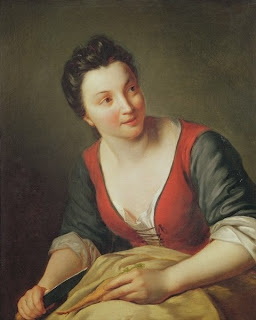When the snow is still blowing against the window-pane in January and February, and the wild winds are howling without, what pleasure it is to plan for summer that is to be! Small shallow wooden boxes are ready, filled with mellow earth (of which I am always careful to lay in a supply before the ground freezes in the autumn), sifted and made damp; into it the precious seeds are dropped with a loving hand. The Pansy seeds lie like grains of gold on the dark soil. I think as I look at them of the splendors of imperial purples folded within them, of their gold and blue and bronze, of all the myriad combina-tions of superb color in their rich velvets. Each one of these small golden grains means such a wealth of beauty and delight! Then the thin flake-like brown seeds of the annual Stocks or Gillyflowers; one little square of paper holds the white Princess Alice va-riety, so many thick double spikes of fragrant snow lie hidden in each thin dry flake! Another paper holds the pale rose-color, another the delicate lilacs, or deep purples, or shrimp pinks, or vivid crimsons, — all are dropped on the earth, lightly covered, gently pressed down; then sprinkled and set in a warm place, they are left to germinate. Next I come to the single Dahlia seeds, rough, dry, misshapen husks, that, being planted thus early, will blossom by the last of June, unfolding their large rich stars in great abundance till frost. They blossom in every variety of color except blue; all shades of red from faint rose to black maroon, and all are gold-centred. They are every shade of yellow from sulphur to flame, — king's flowers, I call them, stately and splendid.
All these and many more are planted. For those that do not bear transplanting I prepare other quarters, half filling shallow boxes with sand, into which I set rows of egg-shells close together, each shell cut off at one end, with a hole for drainage at the bottom. These are filled with earth, and in them the seeds of the lovely yellow, white, and orange Iceland Poppies are sowed. By and by, when comes the happy time for setting them out in the garden beds, the shell can be broken away from the oval ball of earth that holds their roots without distur-bing them, and they are transplanted almost without knowing it. It is curious how differently certain plants feel about this matter of transplan-ting. The more you move a Pansy about the better it seems to like it, and many annuals grow all the better for one transplanting; but to a Poppy it means death, unless it is done in some such careful way as I have described.
Miss Frances Lewis in a Hammok, 1904
Childe Hassam
Vad passar väl bättre att läsa i hängmattan, än en bok om en liten vacker trädgård. Så kan man låta boken falla ned på magen och fantisera om trädgården man ska ta’ itu med när man samlat krafter där i hängmattan.
Eftersom Childe Hassam har illustrerat Celia Thaxters bok ”An Island Garden”, kan jag inte tänka på den ena utan att tänka på den andra. Hela boken finns utlagd på nätet. Alla som har eller har haft en trädgård, känner igen kampen mot sniglar och andra växtmarodörer, och alla hennes odlarmödor — och glädjen över att lyckas få det att växa. och visst är det en god idé att så ömtåliga växter i äggskal!
Celia Thaxter in Her Garden
Childe Hassam
Another enemy to my flowers, and a truly formi-dable one, is my little friend the song-sparrow. Literally he gives the plot of ground no peace if I venture to put seeds into it. He obliges me to start almost all my seeds in boxes, to be transplanted into the beds when the plants are sufficiently tough to have lost their delicacy for his palate and are no longer adapted to his ideal of a salad. All the Sweet Peas, many hundreds of the delicate plants, are every one grown in this way. When they are a foot high with roots a foot long they are all transplanted separately. Even then the little robber attacks them, and, though he cannot uproot, he will "yank" and twist the stems till he has murdered them in the vain hope of pulling up the remnant of a pea which he judges to be somewhere beneath the surface. Then must sticks and supports be draped with yards of old fishing nets to protect the unfortu-nates, and over the Mignonette, and even the Poppy beds and others, I must lay a cover of closely woven wire to keep out the marauder. But I love him still, though sadly he torments me. I have adored his fresh music ever since I was a child, and I only laugh as he sits on the fence watching me with his bright black eyes; there is something quaintly comical and delightful about him, and he sings like a friendly angel. From him I can protect myself, but I cannot save my garden so easily from the hideous slug, for which I have no sentiment save only a fury of extermination.










































